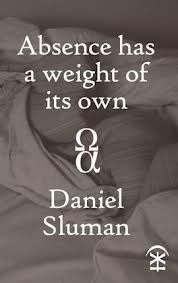reviewed by Amy McCauley
Dealing with a poet of extreme integrity.
Poets often say that poems should feel necessary, compulsive, or inevitable. In reality, of course, unnecessary poems proliferate. Absence has a weight of its own, however, feels like a book that might have saved Daniel Sluman’s life, such is the sense of purpose, authenticity, and yes – necessity.
There’s nothing phoney here. These are poems of lived experience.
It’s a book about bars, drugs and parties; a book filled with movement, restlessness and rage – but the dynamic flow of energy in Sluman’s work is expertly channelled. Rather than the flexing, over-eager lines of Ginsberg, Sluman employs short, well-balanced lines. Lines that allow him to revel in the gradual reveal. Lines which hook the reader on a slow release of facts and detonate upon reaching his powerful end-of-the-line verbs. It’s like Charles Bukowski and Seamus Heaney had a night on the tiles, woke up the next morning and decided to collaborate on a new book. Indeed, the collision of influences here – British, Irish, American – gives Sluman’s voice a real strength, ensuring his beatnik sensibility is skilfully offset by an impressive economy with language.
But even more significant is the fact there’s nothing phoney here. These are poems of lived experience: of the battles we engage in when we desperately want to live. And there is a deep sense of congruence between Sluman’s experience and the poetry which arises out of that experience. A congruence which, to me, suggests the poems have been hard-won in the truest sense of the phrase; one which possesses them of a deep integrity. The sex, for example, is real sex. Not the soft-focus faux-sex of novels for middle-Englanders. So in ‘Picnic’ – a title which suggests a cute, pastoral scene – “the slow-scream / of her hymen tearing // through the grass” (p. 36, lines 9-11) kicks in at line nine like a machete swinging through the middle of the poem and cutting it in two. Similarly in ‘Absence’, the poem which deals most directly with the amputation of Sluman’s leg, he writes: “they cleaved me at the hip; / the flesh was stitched taut, / a finer fabric tore.” (p. 9, lines 4-6) And this action – of tearing, splitting, ripping – operates as a recurrent motif in the book, not simply in relation to Sluman’s highly charged language. It’s evident too in his tactical deployment of the line break, so that where he places his absences is just as important as where he places his words.
His love poems breathe the same air as the poems that deal with illness, debauchery and death. In ‘After the Wedding’ for instance, “your maiden name” becomes “a peppercorn crushed / in my mouth.” (p. 22, lines 12-14) Or in ‘Evocation’ “her name is a fat fuse / tensed between your teeth, // greased with possibilities // that rise and fall like the pale arc / of her hips.” (p. 65, lines 1-5) There is always a sense of action. Of urgency and impetus. But there is also a sense that these poems haunt the places he has been and the people he has loved. There is, in fact, an intense mood of nostalgia in looking back. (Would it be presumptuous to say that when a young person experiences a trauma they become a prematurely nostalgic adult?) This is certainly no criticism, simply an observation of Sluman’s tendency towards a style. A wistfulness perhaps.
If I had to pick fault with this book I would suggest the syntax occasionally feels predictable. I sensed as well, at times, the reeling giddiness of a writer ‘drunk on language’. However, I’m convinced the things I find most vital about Sluman’s work – his choice of subject matter; his gripping voice; the depth and intensity of his gaze; the richness of his engagement with life and the world around him – are far more significant than the things about which I have doubts. The thing is, it’s easy to write a bad poem about coming up on an e. Or about a one-night-stand. Or about leaving a club at 3am. It’s also easy for people to dismiss such subjects as unfit for poetry. It’s much harder to produce good, solid writing about precisely these things – and Sluman’s commitment to drawing on real experience; the nitty-gritty of life – is what makes this work so vital. Plus it has enough pulse, enough muscle, and enough bite to attract young blood to the scene.
The quality I most associate with Sluman’s work is that of extremity: and because extremity – that is, experience people find challenging, difficult or complicated – is something so rare, this book burns all the more brightly. Though perhaps extremity isn’t really what I mean. Messiness, I suppose is the word. Proximity to the edge of oneself and one’s experience of life. Yet Sluman doesn’t get so close to his subjects that the writing goes bad. He rages against God. Against time. Against the nothingness we pit ourselves against. And the pain he expresses is authentic, fascinating, gruelling, addictive.










